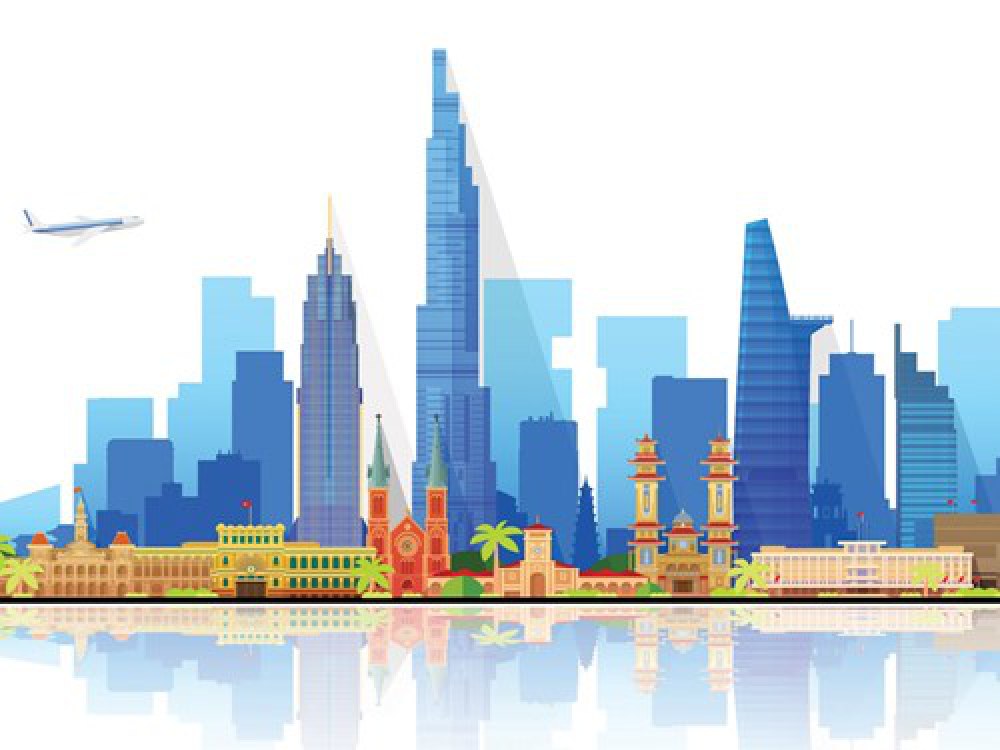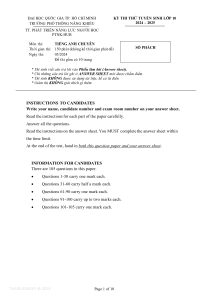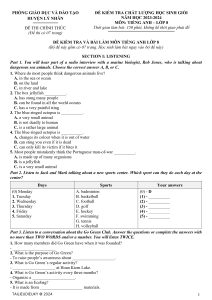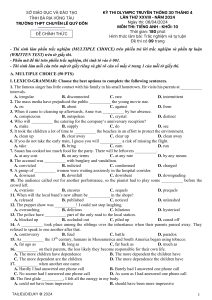ĐỀ THI CHÍNH THỨC TUYỂN SINH LỚP 10 THPT TP HỒ CHÍ MINH – NĂM HỌC 2019-2020 MÔN: TIẾNG ANH (Môn chuyên) là một tài liệu quan trọng và hữu ích cho các thí sinh chuẩn bị thi vào trường THPT Chuyên Lê Hồng Phong, THPT Chuyên Trần Đại Nghĩa tại TPHCM. Tài liệu này chứa đầy đủ các đề thi chính thức và đáp án, giúp các thí sinh ôn luyện và củng cố kiến thức môn Tiếng Anh một cách hiệu quả.
Trang web Tài liệu diệu kỳ cung cấp nhiều tài liệu và đề thi khác nhau cho các môn học và kỳ thi khác nhau, bao gồm cả sách và tài liệu Tiếng Anh nâng cao (CPE, CAE, FCE), đề thi Trung học phổ thông Quốc gia, đề thi chọn học sinh giỏi Tiếng Anh lớp 10, 11 và 12 THPT, đề thi chính thức và đề xuất các kỳ thi Olympic Tiếng Anh, cùng với tài liệu luyện thi chứng chỉ IELTS và nhiều tài liệu học thuật khác.
Các tài liệu trên trang web được cập nhật liên tục để đảm bảo tính chính xác và phù hợp với các kỳ thi mới nhất. Để tìm kiếm bài viết này trên Google, các từ khóa có thể sử dụng là: "Đề thi tuyển sinh lớp 10 chuyên TP HCM", "Đề thi chính thức Tiếng Anh lớp 10 chuyên", "Tài liệu ôn luyện thi THPT Chuyên", "Tài liệu Tiếng Anh cho học sinh chuyên", "Tài liệu đề thi Olympic Tiếng Anh", "Luyện thi chứng chỉ IELTS", "Tài liệu Tiếng Anh nâng cao".
Trích dẫn nội dung :
I. USE OF ENGLISH (30 PTS)
PART A: CHOOSE THE CORRECT ANSWER TO FILL IN THE BLANK. (10 PTS)
1. __________ comes a time when you have to make a decision and stick to it.
A. It B. That C. Then D. There
2. You __________ come out to the airport to meet me. I could have taken a bus.
A. needn’t have B. needn’t C. don’t need to D. didn’t need to
3. By the end of the first half of the twenty-first century women __________ against men in many sports.
A. compete B. are competing C. are going to complete D. will be competing
4. More and more trees in this area are found __________ from the effect of pollution.
A. died B. to be dead C. to be dying D. having died
5. The food she has prepared for the party is not enough, for there are __________ more people showing up.
A. so B. too C. any D. many
6. Minh Thu changed her major from literature to English __________.
A. with the hope to be offered employment easier B. hoping more easily she gets a job
C. with the hope for being able to find better job D. hoping to find a job more easily
7. __________, the film began.
A. All of us have taken the seats B. All of us having taken the seats
C. We all having seated D. We all have been seated
8. They still haven’t made a decision __________ the new color scheme.
A. on reflection of B. with a view to C. with regard to D. by contrast with
9. ‘The 20-year policy would be a good investment’, said the insurance agent, ‘__________ you wanted to cash it within the first ten years.’
A. even though B. in case C. lest D. even if
10. I often wish I could afford to work less, __________ people, I suspect.
A. like do most B. as do most C. the same most D. as much the same most
11. How much __________ do Jerry’s opinions carry with the committee?
A. importance B. value C. weight D. worth
12. Many small businesses have __________ victim to the recent economic recession.
A. become B. been C. blamed D. fallen
13. Road conditions are difficult because of the __________ rain.
A. driving B. jumping C. riding D. running
14. Kathy __________ comes up with a solution when everyone else is at a loss.
A. absolutely B. invariably C. persistently D. universally
15. She __________ till the early hours listening to music.
A. caught me up B. picked me up C. kept me up D. took me up
16. Making mistakes is all __________ of growing up.
A. flesh and blood B. odds and ends C. part and parcel D. top and bottom
17. They live miles away, __________.
A. split down the middle B. from a distance C. nearly nowhere D. in the middle of nowhere
18. Many students __________ night after night to prepare for their coming exams.
A. burn the midnight oil B. turn the tables on C. rack their minds D. fight tooth and nail
19. _ Mary: ‘Could I go out with my friends tonight, Mommy?’ _ Mother: ‘__________.’
A. Yes, you go B. Yes, you can C. Yes, you will D. Yes, let’s
20. _ Mai: ‘How was the film you saw last night?’ _ Hoa: ‘__________.’
A. I’ve seen better B. No, I didn’t C. I think of it much D. I like them all
PART B: CHOOSE THE WORD OR PHRASE THAT BEST FITS EACH SPACE IN THE FOLLOWING PASSAGE. (20 PTS)
PASSAGE 1
In this week’s issue, our resident film critic discusses the etiquette of cinema going, and the audiences who prefer chewing hotdogs, slurping drinks, gossiping and rustling crisp packets to actually watching the film. (1) __________ complaint, or just cinema snobbery?
It’s the munchers and talkers, not those who complain about them, who are (2) __________ other people’s simple pleasures and the (3) __________ seem to me to be self-evident. Junk foods and even popcorn and choc ices, when eaten in a (4) __________ and possibly crowded space, are (5) __________ to demand living space. They spread themselves – usually onto other people’s (6) __________. Crisps, peanuts and boiled sweets make a lot of noise, first when being (7) __________ then when being crunched or sucked. These are definite (8), especially if you yourself – having merely come to see and hear the film – are not eating and not therefore generously (9) __________ your fried onions, mustard and ketchup with the trousers of the stranger in the (10) __________ seat.
1. A. Discernible B. Fair C. Feasible D. Official
2. A. damaging B. spoiling C. hurting D. injuring
3. A. excuses B. accusations C. reasons D. complaints
4. A. confined B. closed C. reduced D. narrow
5. A. cajoled B. entitled C. inclined D. tempted
6. A. dress B. costume C. outfit D. clothing
7. A. unpacked B. untied C. unwrapped D. unfolded
8. A. inconveniences B. amusements C. anxieties D. irritations
9. A. exchanging B. dividing C. splitting D. sharing
10. A. next B. nearest C. previous D. closest
PASSAGE 2
There is a revolution in the retail world that cannot fail to attract shoppers’ noses. In the latest marketing ploy, smells are created in laboratories to be wafted around stores in order to (1) __________ the unsuspecting into spending more money. Secret (2) __________ of the ‘designer’ smells are going on in more than a hundred stores across Britain, including bookshops, petrol stations and a chain of clothes shops. The tailor-made aromas include coconut oil in travel agents (to (3) __________ exotic holidays), and leather in car showrooms (to suggest lasting quality).
Market Aromatics, a company specialising in this area, believes that odours are under-used as a marketing (4) __________. Until now the most frequent (5) __________ has been in supermarkets where the smell from in-store bakeries has been blown among the aisles to boost sales of fresh food. ‘We are taking things one stage further,’ said David Fellowes, the company’s commercial director. “We can build on customer loyalty by making customers (6) __________ a particular smell with a particular store. It is not intrusive. If it were it would defeat the object.’
The smells are designed to work on three levels: to relax shoppers by using natural smells such as peppermint; to bring back memories using odours such as a whiff of sea breeze; and to encourage customer loyalty by using a corporate perfume ‘logo’ to (7) __________ a company’s image. Dr George Dodd, scientific adviser to Marketing Aromatics, believes smells can affect people’s moods. ‘It is a very exciting time. Smells have enormous (8) __________ to influence behaviour,’ he said. Critics say retailers are (9) __________ to subliminal advertising. ‘Not telling consumers that this is happening is an (10) __________ invasion of their privacy. People have the right to know,’ said Conor Foley of Liberty, the civil liberties association.
1. A. entice B. trap C. force D. deceive
2. A. investigations B. analyses C. operations D. trials
3. A. remember B. arouse C. evoke D. desire
4. A. advertisement B. tool C. gadget D. gimmick
5. A. effect B. concept C. type D. application
6. A. join B. associate C. relate D. merge
7. A. make B. fix C. capture D. promote
8. A. concentration B. adaptation C. potential D. efficiency
9. A. resorting B. taking C. moving D. reacting
10. A. undeserving B. unjustified C. unofficial D. unlicensed
II. READING (35 PTS)
PART A: READ THE PASSAGE AND CHOOSE THE BEST ANSWERS TO THE QUESTIONS (10 PTS)
The spectacular aurora light displays that appear in Earth’s atmosphere around the north and south magnetic poles were once mysterious phenomena. Now, scientists have data from satellites and ground-based observations from which we know that the aurora brilliance is an immense electrical discharge similar to that occurring in a neon sign.
To understand the cause of auroras, first picture the Earth enclosed by its magnetosphere, a huge region created by the Earth’s magnetic field. Outside the magnetosphere, blasting toward the Earth is the solar wind, a swiftly moving plasma of ionized gases with its own magnetic field.
Charged particles in this solar wind speed earthward along the solar wind’s magnetic lines of force with a spiralling motion. The Earth’s magnetosphere is a barrier to the solar wind, and forces the charged particles of the solar wind to flow around the magnetosphere itself. But in the polar regions, the magnetic lines of force of the Earth and of the solar wind bunch together. Here many of the solar wind’s charged particles breakthrough the magnetosphere and enter Earth’s magnetic field. They then spiral back and forth between the Earth’s magnetic poles very rapidly. In the polar regions, electrons from the solar wind ionize and excite the atoms and molecules of the upper atmosphere, causing them to emit aurora radiations of visible light.
The colors of an aurora depend on the atoms emitting them. The dominant greenish white light comes from low energy excitation of oxygen atoms. During huge magnetic storms oxygen atoms also undergo high energy excitation and emit crimson light. Excited nitrogen atoms contribute bands of color varying from blue to violet. Viewed from outer space, auroras can be seen as dimly glowing belts wrapped around each of the Earth’s magnetic poles. Each aurora hangs like a curtain of light stretching over the polar regions and into the higher latitudes. When the solar flares that result in magnetic storms and aurora activity are very intense, aurora displays may extend as far as the southern regions of the United States.
Studies of auroras have given physicists new information about the behavior of plasmas, which has helped to explain the nature of outer space and is being applied in attempts to harness energy from the fusion of atoms.
1. What does the passage mainly discuss?
A. The methods used to observe auroras from outer space.
B. The formation and appearance of auroras around the Earth’s poles
C. The factors that cause the variety of colors in auroras.
D. The periodic variation in the display of auroras.
2. The word “phenomena” in paragraph 1 is closest in meaning to __________.
A. ideas B. stars C. events D. colors
3. The word “picture” in paragraph 2 is closest in meaning to __________.
А. frame B. imagine C. describe D. explain
4. The passage describes “the magnetosphere as a barrier” because __________.
A. its position makes it difficult to be observed from Earth
B. it prevents particles from the solar wind from easily entering Earth’s atmosphere
C. it increases the speed of particles from the solar wind
D. it is strongest in the polar regions
5. The word “them” in paragraph 3 refers to __________.
A. polar regions B. electrons C. atoms and molecules D. aurora radiations
6. According to the passage, which color appears most frequently in an aurora display?
A. greenish-white B. crimson C. blue D. violet
7. The word “glowing” in paragraph 4 is closest in meaning to __________.
A. shining B. moving C. charging D. hanging
8. Auroras may be seen in the southern regions of the United States when __________.
A. magnetic storms do not affect Earth B. solar flares are very intense
C. the speed of the solar wind is reduced D. the excitation of atoms is low
9. The passage supports which of the following statement about scientists’ understanding of auroras?
A. Before advances in technology, including satellites, scientists knew little about auroras.
B. New knowledge about the fusions of atoms allowed scientists to learn more about auroras.
C. Scientists cannot explain the cause of the different colors in auroras.
D. Until scientists learn more about plasma physics, little knowledge about auroras will be available.
10. Which of the following terms is defined in the passage?
A. “magnetosphere” B. “electrons” C. “ionize” D. “fusion”
PART B: REARRANGE THE FOLLOWING SENTENCES SO THAT THEY MAKE A MEANINGFUL TEXT ABOUT A MEMORY TECHNIQUE. (5 PTS)
The technique was formalized by Dr. Gruneborg.
The Linkword Technique uses images to link a word in one language with another word in another language.
It is claimed that by using this technique the basic vocabulary can be acquired in just 10 hours.
For example, if an English person wanted to learn the French word for carpet – tapis, he might imagine an oriental carpet where a tap is the central design. Tap is has the same spelling as tapis so he will remember the French for carpet.
Linkword books have been produced in many language pairs to help students acquire the basic vocabulary needed to get by in a language (usually about 1,000 words).
PART C: SUPPLY EACH BLANK WITH ONE SUITABLE WORD. (2.0 PTS)
PASSAGE 1
Journalists gather the news in a number of different (1) __________. They may get stories from pressure (2) __________ which want to air their views in public. They seek publicity (3) __________ their opinions and may hold press (4) __________ or may issue a press release. A person who especially wishes to attract news (5) __________ will try to (6) __________ a sound bite in what they say. It is particularly hard for journalists to get material (7) __________ the silly season. Journalists also get stories by tapping useful sources (8) __________ by monitoring international news (9) __________ like Reuters. The more important a story is, the more (10) __________ inches it will be given in the newspaper.
PASSAGE 2
One day it will seem strange (1) __________ retrospect, that we spent much more thought and effort on developing human ability than on making good (2) __________ of it, once we had it. There innumerable examples. We (3) __________ them in casual conversation and occasionally they catch a journalist’s attention.
Doctors provide a good source of complaints: they (4) __________ to undergo a particularly protracted and detailed training and – at the end of it – many of them spend a substantial part of their (5) __________ day in relatively routine or clerical operations. Has anyone ever considered how much money could be saved by splitting (6) __________ these two aspects of a GP’s job? Nurses have recently reiterated their age-old complaint that their scarce and (7) __________ womanpower is frittered away in quite unskilled work. The educational world is (8) __________ of examples of highly paid specialists typing their own letters with two (9) __________. We promote top research academics to headships of departments and give them inadequate support services. Even in business, the provision of secretarial help tends to go by seniority and not by the (10) __________ of routine work that has to be done.
III. ERROR IDENTIFICATION (5 PTS)
IDENTIFY THE FIVE (5) MISTAKES IN THE FOLLOWING PASSAGE AND CORRECT THEM.
IV. WORD FORMS (10 PTS)
SUPPLY THE APPROPRIATE FORMS OF WORDS IN THE BRACKETS.
1. Traffic in Ho Chi Minh City has become __________ for the past few years. [grid]
2. I wish the local authorities would make the city center more __________. [bicycle]
3. __________ material such as plastic and polymer are causing more and more damage to the environment. [grade]
4. __________ play centers are valuable for all children to spend their free time. [school]
5. The general opinion is that good qualifications are a __________ to a well-paid job. [gate]
6. Examinations coming, education is once again in the __________. [spot]
7. There is a tendency in news reports to __________ complex issues to make the news more entertaining. [simple]
8. In focusing on vocational training, the official did not mean to __________ the role of university education. [play]
9. The opening ceremony ended __________ with fireworks. [sense]
10. Many parents __________ place their children in danger by not making sure they wear seat belts. [wit]
V. WRITING (20 PTS)
REWRITE THE FOLLOWING SENTENCES WITHOUT CHANGING THE MEANING OF THE ORIGINAL SENTENCE. YOU HAVE TO USE BETWEEN 3 AND 8 WORDS INCLUDING THE EXACT WORD GIVEN IN BRACKETS FOR EACH SENTENCE.
1. What surprises me is that they are not worried about pollution in our city. [seem]
→ Surprising worries about pollution in our city.
2. What Anna hates most is posing for photographs. [than]
→ There’s a pose for photographs.
3. We suspected the weather would get cold so we took warm clothes. [anticipation]
→ We took warm clothes cold.
4. Whenever I listen to that piece of music, I remember my schooldays. [back]
→ That piece of music to my schooldays.
5. To maintain good industrial relations, we must do all we can to avoid confrontation with management. [costs]
→ Confrontation with management to maintain good industrial relations.
6. Having little financial support, the student lived very cheaply. [shoestring]
→ The student little financial support.
7. You have no hope of succeeding if you are so careless with your work. [bound]
→ You careful with your work.
8. Anna had to endure a long and difficult interview before she got the job. [subjected]
→ Anna was only a long and difficult interview.
9. In case of emergency, Peter is someone you can always rely on. [down]
→ Peter will an emergency.
10. George suggested a list of guests should be written. [drawn]
→ “Why not ?” said George.
THE END OF THE TEST



